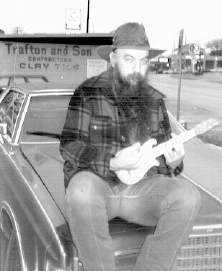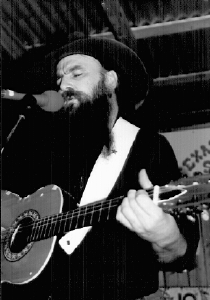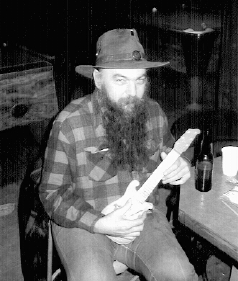
03/26/97: I have added 3 photographs of Blaze at the bottom of the page. Thanks to Lost John Casner.
Guns can change things quickly, drastically, and tragically.
The Duct Tape Messiah died in a single blaze of rifle fire on February 1, 1989. He was 39.
My first memories of Blaze Foley date back to emmajoe's. He was decked out in duct tape and mercurochrome. He was asleep under the pool table. A game of 8-ball was in progress on the green felt above him. Every time someone made a ball and it dropped with a thud Blaze would rouse up, smack his forehead on the bottom of the table and sprawl back out. Several championships were decided over his head as he slumbered on.
The week "Pancho And Lefty," sung by Willie & Merle, hit No. 1 Townes Van Zandt, who wrote it, checked into the State Hospital on Tuesday. On Saturday he checked himself out to play his end of the month rent gig at emmajoe's. Sober and determined, but strained and weak, Townes struggled through his set that night.
During "If I Needed You" he forgot the lyrics and faltered. Blaze glided gracefully to his side and sang the words for him, then harmonized with him as Townes got back on track. After the song Blaze quietly sat back down near the stage. Townes grew stronger from that point and it almost seemed that a direct energy transfer from Blaze had occurred.
My opinion of Blaze had been vaguely negative until that night. That single gesture caused me to change my mind. I realized he had character. He had displayed courage, caring, and perfect timing. From that moment on I took him more seriously. I began to listen to his music. And I got to know him.
At my house one night, I asked Blaze if he might be related to an old friend of mine, Mike Foley, who resembled him somewhat. He said no, he had changed his name for show business purposes. He'd wanted a colorful, memorable name. He liked Red Foley's name and considered becoming Blue Foley. Or Blues Foley. He kept working with the name and got Blaze Foley and knew it was right. He became Blaze Foley and he burned brightly, sometimes dangerously so.
That night he told me that he was totally committed to his career as a songwriter and would never have a day job because that might dull his ambition or detour him from his artistic goals. He was uncompromising on that point and I never knew him to hold down a job just so he could pay rent. Blaze preferred the sofa circuit and he rotated among friends and lovers for sleeping quarters. He didn't even have a car to sleep in in a pinch. And he didn't care.
Blaze knew Newt Gingrich before Newt took his hard right turn and got elected to congress. Newt liked to hear Blaze sing, and he called him "My own Bob Dylan."
The afternoon of June 26, 1986 I got inside information that Dylan was shopping at Electric Ladyland. My daughter Sara and I hopped in the car and drove there. Sure enough Dylan was in the store selecting masks, headgear, jackets, and other articles from the stock of costumes and fancy clothing and piling them on the counter. I tried to think of how to tell him that I'd been playing his records on the radio for 25 years without spooking him and making him think I was a jerk, but Sara kept asking me to come look at stuff and that opportunity slipped away.
Blaze came in the store and went into the room where Dylan was. A few minutes later Blaze came in the store again. He said, "Bob Dylan is outside talking to Townes. Come on, I'll introduce you to him." By the time we got out in front of the store the drifter had escaped and Townes was sitting in the car with Pussycat and Indian Gary. They had all been on a binge and none of them was seeing too straight.
Blaze told me he had walked up to Dylan, introduced himself and said Townes was out front. Dylan had wanted to meet Townes, and they had immediately gone outside. Blaze had seen me on the way out and had come back in to get me after he introduced Dylan to Townes.
Blaze talked Townes and Linda Shaw out of enough money to go back into Electric Ladyland to buy a Ronald Reagan mask. He carried that mask around for months, sometimes sneaking a few beers out of the bar in it after hours.
Blaze pulled a beer out of Ronald Reagan's head and popped the top on the way out the door. We had been talking and listening to music at my house since the clubs had closed three hours before. I was giving him a ride to a friend's place a dozen blocks away. His friend got up at 5:30 a.m. and went to work at six. Blaze was going to sleep in his bed while he was at work.
It was a hot Austin summer night. Blaze set his Corona on the roof of my car so he could open the door and stow his stuff in the back seat. When he reached for the beer he knocked it over and it rolled down the slope of the roof, emptying itself along the way. The bottle bounced on the street and didn't break. We laughed about it and headed for Blaze's borrowed bed.
After I dropped him off I drove to the car wash and washed the beer off the car. I knew the blazing Texas sun would bake the beer into the finish and damage the paint if I didn't. Running with Blaze was always an adventure, and having to wash my car at dawn didn't faze me in the least.
Blaze was a good judge of talent and, early on, gave me copies of Pat MacDonald's pre-Timbuk3 albums. The last time I saw Blaze he was sitting in with Timbuk3 at The Hole In The Wall.
If you cover the Austin music beat you often see musicians called up from the audience for a short guest set, usually two songs, sometimes more. I had noticed that when Blaze got called up he'd do one of his own compositions, sometimes "Oval Room," other times "If I Could Only Fly," and he would also do Mississippi Fred MacDowell's "You Got To Move." One time I asked Blaze why he always sang "You Got To Move" instead of singing two of his own songs so people could hear what he wrote. I can't recall his exact answer---it was years ago---but he reminded me of my question, in public, that last night that I saw him.
Billing themselves as Fred & Wilma to avoid an over-large crowd, Timbuk3 played at The Hole In The Wall on January 25 with Blaze opening. During the last set Pat & Barbara K. called him to the stage, saying: "Blaze Foley was our first friend in Austin. He was on the street, we were on the street..."
Blaze strapped on a guitar, thanking Jubal Clark for the loan of it. He looked over at me and smiled that smile that crinkled his face, and with that twinkle in his eye he said into the microphone: "This is a Mississippi Fred MacDowell song. Larry Monroe wonders why I always sing this song...and I'm glad he does."
Then Blaze and the folks who called him their first friend in Austin sang:
"You Got To Move...
You Got To Move,
You Got To Move, child,
You Got To Move.
When the Lord gets ready,
You Got To Move."
One week later Blaze was dead and I understood why he always sang "You Got To Move."
After services in an overflowing chapel, several of us got lost on our way to the cemetery. Blaze smiled. With a few songs to send him off and some shared tears among his friends, the gathering at graveside broke out the duct tape and decorated his coffin. Blaze laughed out loud.
In a coffin covered with duct tape one of the most unique characters who ever resided in the Austin music community was lowered into the ground. He will be sorely missed.
Ladies and gentlemen . . .
Blaze Foley has left the building.



FastCounter by bCentral |